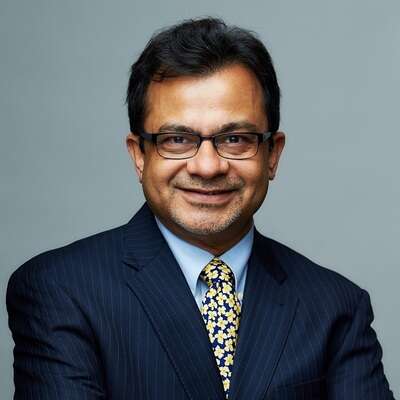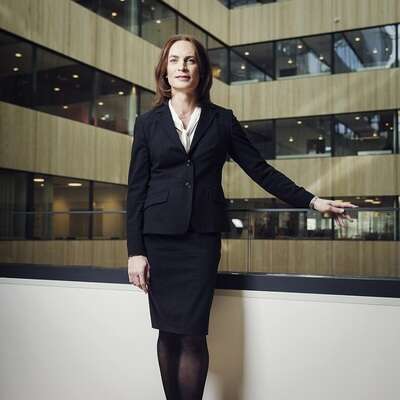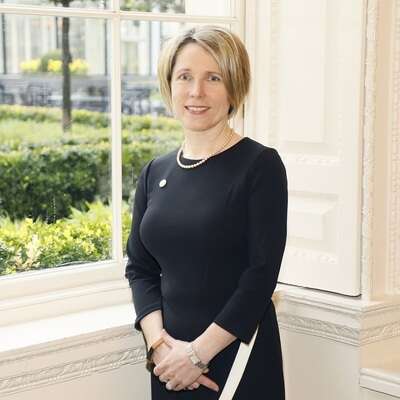Tata Consultancy Services Executive Director and Country Head, Canada, Soumen Roy discusses technology’s impact on civilisation, advances in the digital ecosystem, the ever-widening skills gap, and COVID-19 effects across technology and leadership.
Boyden’s Leadership Series presents discussions with thought leaders from organisations across the globe. The series focuses on topical issues that offer executives, political leaders and the media insight into current trends in business and talent management in the global marketplace.
This issue features Soumen Roy, Executive Director and Country Head, Canada, at Tata Consultancy Services (TCS). Roy talks about technology’s role in civilisation, it’s impact on brain functionality and the meaning of ‘artful science’ in Canada.
Soumen Roy has spent the last 22 years of his career at TCS. He is a board director for TECHNATION (formerly ITAC), the Information Technology Association of Canada, C-IBC , the Canada-India Business Council and CORE, the Centre for Outsourcing Research & Education. Soumen holds an MBA from the Indian Institute of Technology and a Bachelor of Engineering from the University of North Bengal.
Tata Consultancy Services (TCS) is the world’s largest IT services provider and part of Tata Group, one of India’s largest multinational conglomerates. TCS was established in 1968 and today employs about 450,000 people in almost 50 countries.

Boyden: Tata’s business stretches across every aspect of life. Is it fair to say the company touches the day-to-day experience of almost everyone?
Roy: That’s true, when we were growing up in India, even before and now too there was a little bit of Tata in everyone’s life, from salt to software. So, this question is very close to my heart. TCS is such a phenomenal story, not just its growth trajectory over the last 50 years, but also its enormous value to the people it touches; its employees, shareholders, customers, beneficiaries and even nations.
For example, until the early 2000s it took up to three months to get your first passport in India. Today, it takes less than three working days, thanks to the end-to-end digital processes TCS has implemented through our work with the Indian government. There is absolutely no bypassing of checks and balances. Instead, we’ve simply digitized work flows.
So yes, one in every six citizens of the world is touched by processes enabled and run by TCS. We also impact people’s lives by working in a host of other industries, such as telecommunications and banking.
"Our industry has become so essential, and the work we do for customers is mission-critical."
In Canada, the top banks are the digital partner for an estimated twenty-six million economically active Canadians. They are the instruments for salary delivery, investments and market interaction. In addition, TCS serves as the primary partner for the digital needs of organisations such as Amex, Citibank, Rogers, Apple, and Microsoft, again touching every economically active citizen in Canada. The extent and impact of the digital connection we enable is enormous.
Boyden: Most business leaders say that COVID-19 has been their greatest professional challenge. What impact has the pandemic had on you?
Roy: Like all other businesses in the pandemic, TCS too was surprised by the suddenness of the impact. We adopted a simple three-stage strategy. First, employee safety is a priority not to be compromised. Second, how do we ensure business continuity for our customers? Our industry has become so essential, and the work we do for customers is mission-critical. In banking, we can’t have the ATM not work; in hospitals we can’t have the data systems not function; we cannot stop anything in any industry that we service. Third, how do we sustain our own revenue and business so that we can continue to support our customers and keep our employees safe sustainably.
How did we achieve this?
We institutionalised our ‘SBWSTM’ - Secured Borderless Work Spaces model. It meant that whatever work employees were doing was enabled in a secure way so that they could deliver it from wherever they are, safely. We secured data and information flow through various proven technology solutions, ensuring mission-critical applications continued to function and customer information was kept secure. This process was technologically enabled in an accelerated way for almost 95 percent of our work.
However, there are specific types of work, by virtue of their nature and client requirements, which needed to be continued at least minimally from various Global Delivery Centres of TCS spread over India, Asia, Europe and the Americas. Such work continued from a secure physical place, and strict health and safety protocols were put in place to keep workers safe at those sites.
Boyden: Has the pandemic changed your approach to leadership for the long term?
Roy: My leadership formula for the pandemic is 4 x 2R!
It’s about how an institution and individuals will change if you put a framework around it. The first 2R is React and Recover. Disruption, whether a pandemic or personal crisis is a part of life. The impact might be different, but it is part of daily life. So, to react and recover is fundamental.
The second 2R is Resilience and Reaffirm. Once you get over the shock, you have to eat and continue to live and reaffirm the basic purpose of your life. If you stop breathing your body will make you breathe. It’s very powerful. Resilience and reaffirm. I know I have to live.
Third, you start Redefining and Reinventing the core values you live for. What is more important in life? I have never spent so much time interacting with my daughter as I have this year. So, you start redefining your values.
The fourth is Re-energise and Rebound. Reality has settled in so we will be talking about what the future looks like. It’s not the same map as six months ago. The pandemic has taught us life may not be the same.
Every institution, individual and system must go through this test. The ones that recover, reaffirm, reinvent and rebound will be better equipped to face the future.
Boyden: What is your view on digital transformation in the post-peak COVID environment?
Roy: New approaches have been tested and the future of work will certainly be different. The necessity of offices and their critical use will be redefined. Our leadership team has launched a framework called 25-25-25 as we move toward a state where only 25 per cent of our workforce needs to be in the office at any given time; 25 percent of the time by each employee will be sufficient at their physical work location; and this may happen as soon as 2025, based on applicability and adaptation.
"We have to have an augmented life, and artificial means to sustain human civilisation by harnessing resources, recycling, re-adapting and so on. This is only possible through digital and technological means."
Today, about 95 percent of our people are working remotely now, which means it is doable. I want to see my teams, there is value in that yes, but what is the extra value we get from being physically together? It’s important to think about it from that perspective, because there is still risk of the unknown, unless we have a solution in the form of a medicine or vaccine. An institution provides belonging through physical proximity. Having coffee together provides emotional connection. How do we enhance that connection now that work is delivered remotely?
The institutional value of belonging will also be redefined. In the past, employees got together and participated in team-building activities. Today, digital delivery has expanded what is possible. In the last three months, TCS Canada employees joined online with their families to learn better breathing exercises. So that’s extra value; your family may also be getting a sense of belonging now.
In terms of brand, the majority of employees, students and other stakeholders are already consuming through digital means. That will be the prevalent channel for branding. It may be easy or difficult; I don’t know yet, but it will be a necessity.

Boyden: With advances in AI, IoT and Industry 5.0, how would you describe the evolving digital ecosystem?
Roy: We are so lucky that our generation can enable, reach and include our entire civilisation.
With today’s global population, we can unequivocally agree there is no way we can organically sustain eight billion of one species. We have to have an augmented life, and artificial means to sustain human civilisation by harnessing resources, recycling, re-adapting and so on. This is only possible through digital and technological means.
"Technology has never seen a recession in the history of civilisation and it never will. It is part of life’s sustenance."
Even today there are communities in the north of Canada that are almost inaccessible and digital connection is the best way of including them in society.
So that’s physical remoteness, but what about economic remoteness?
To reach less privileged communities around the world, the only way is to democratise technology. When the cell-phone came to India on a mass scale, small shop owners were so proud to give you their number. While others were concerned about privacy, why was this section of society so keen? Because there is no other measure of identity, no biometric, no passport. If you live in a small town selling say fish, there is no way to establish your identity. The cell-phone gives you the option to do more from your own small supply chain, connect to customers and deliver more value to society.
So technological advances are phenomenal. Technology has never seen a recession in the history of civilisation and it never will. It is part of life’s sustenance. Technology has a value that is an integral and unavoidable part of our lives; the increase in spending on hardware, software, connectivity and cell-phones outstrips any other increase in income or spending.
IoT is only going to accelerate. Smart televisions, fridges, air conditioners and so on are already intelligent enough to understand language. That empowers you to do more, efficiently. Our originality and efficiency will grow leaps and bounds with the adoption of IoT in everyday life.
So, the relationship between man and machines is being redefined. The challenge will be, how do we keep up our own human brain functionality? How do we educate ourselves and live up to the speed of technological change as individuals?
Boyden: Do you perceive a widening skills gap today between the needs of business and what education can provide in ever shorter timeframes?
Roy: then it comes to man and machine, I am an optimist. The machine is designed for me, reacting to my needs today. Let’s say the median age of the world is 40. For a 40 year-old, there is still an element of doubt that because of my ‘ignorance’ at this stage, the machine knows more than me.
"One thing will become very prominent; our ability to understand natural and artificial algorithms. People think algorithms are something to do with programming. They are not."
However, the next generation, including my 18 year-old daughter, has never felt ruffled by the multiplicity of gadgets in her life. There is a paradigm shift here as the new generation is born into this technologically rich environment and perceives it differently. They will have more access to things than we had and will use them for their personal benefit.
So their lives will be augmented anyway. Since they are born into a situation with everything in place, they don’t need to find out what created them. When I did my master's my biggest worry was the physical reality of how data travelled to my laptop. My daughter knows simply, ‘I have this data if I do this’. That shift will enable people to cope with enhancement. One thing will become very prominent: Our ability to understand natural and artificial algorithms. People think algorithms are something to do with programming. They are not.
For example, I visited a university in Canada recently where they offer graduate courses that converge arts and sciences. I learned how such studies are going deep into the art of science of anatomy of cell formation, trying to find and decode the artistic part of it into an algorithm. I saw the depiction of different artful science depicting cellular formations. It was something I hadn’t even imagined could happen. Such convergences of data algorithms and art are unique. Next-generation technology includes the likes of genomics.
There is always a skills gap between education and the real world. Education is designed to be incremental, but the design of digital capabilities at the consumer level happens 10 times faster, from optional to widespread use. That shift happened in 15 years. Our education has not shifted that much in 15 years, so a gap will exist.
Boyden: India is a world leader in software expertise. How do you see this evolving and how might it shape India’s commercial future?
"India will lead the way in solving problems of mass scale in future."
Roy: Solutions and inventions happen when problems are most potent. Civilisation evolved over five thousand years, so there are going to be lots of problems. India’s leapfrog into tech came from not having enough physical network, so the digital network served a purpose.
India’s digital payment system is more secure than most countries in the world, because they needed it. TCS participated in the program. Today, if the prime minister in India announces that by a national program say 50 bucks is going into everyone’s pocket as a subsidy or something, it can go straight into their bank accounts without any intermediary. India will lead the way in solving problems of mass scale in the future.
India has an advantage because it has created a ‘talent cloud’; hardware moved into cloud software long back. Your knowledge referral banks have gone to cloud too, such as Google, Wiki, and so on. Now it’s time for human talent to move to cloud for global and easy access. No one buys a server for Facebook; it is somewhere in the cloud. India will have difficulties and problems, but fundamentally, it will enjoy the advances made over the last 30 years.
Amongst other areas of interests, an affinity towards science and engineering has given India its position today.
Because of its size, India is a great place to solve human problems and it enriches knowledge much faster than other countries. Take food delivery. There are so many apps for this in India and each has a market, providing greater possibilities for enrichment.

Boyden: In Toronto, you are a member of the board of CORE, the Centre for Outsourcing Research & Education. Tata also has a major commitment to learning and development. Education clearly resonates very strongly with you.
Roy: Education is quietly shifting toward the need for multiple skills on top of a foundation that is robust enough to survive. You can study 29 different specifications of cybersecurity, but you also need to know the basics of IT and how cybersecurity is deployed across different channels of consumption.
What will eventually happen is that you will be certified by Microsoft or Apple, not an educational institution but organisations closer to real life who know what the consumer needs. Certifications are becoming more valuable for real-life work than a degree or a masters in IT, because the reality of usage and impact on how we live is what is important.
With education platforms, including those built by TCS, a lot is possible in a short time. What takes time is accreditation or certification. For example, a standard educational university can offer lots of cybersecurity offerings, keeping on top of advances, but the technology has to be standardized, accredited and made marketable. So, for the knowledge to be marketable, the certification needs to be marketable.
Awareness of this is already there, but it is not yet integrated in a systemic way. TCS has created a platform, TCS iON, to enable that, but it came from a different need. Today in India, for any job or public services exam there will be millions of applicants. The sheer scale, the identity, the sanctity of the product is huge. TCS iON is a tech platform on which you can run simultaneous exams for thousands of people at the same time, in hundreds of designated centres.
It is also content rich. We can design an exam and then extend it to impart education remotely. Universities can sign up to the platform, enrich it, and create more with it. To be commercially relevant, it needs certification in each market. It can be perfected for any market, so corporations can procure and make it their own platform for learning.
Technology democratises education and the lives of citizens. That’s why there will be no technology recession. How many more people are using Microsoft Teams, Google Meet, and many other platforms? The use of technology has increased linearly and erupted exponentially.
Boyden: Having crafted such a long and distinguished career at Tata, what would your advice be to today’s aspiring leaders?
Roy: The pace of change has changed significantly in the last few decades. As leaders it is imperative to learn and adapt more and faster. Design thinking can never be complete or future-proof unless it is enriched with inclusiveness and diversity.
Importantly, we need to be humbler as our individual knowledge will depreciate faster than ever before; hence collaboration and inclusive team enablement will hold the keys to achieving institutional goals.
And finally, not least, understanding and adapting the purpose of life within the core value system is going to mean so much to everything we do with integrity. It is evident more so, with the recent pandemic teaching us how important is it for the entire globe to be together for the human race to survive.
We would like to thank Kevin Gormely, Managing Partner at Boyden Canada for making this edition of Boyden’s Leadership Series possible.
The views and opinions expressed here do not necessarily represent the views of Boyden, only those of Mr. Roy.




